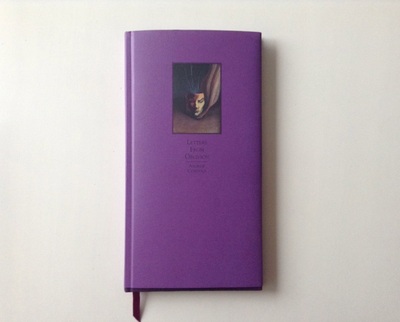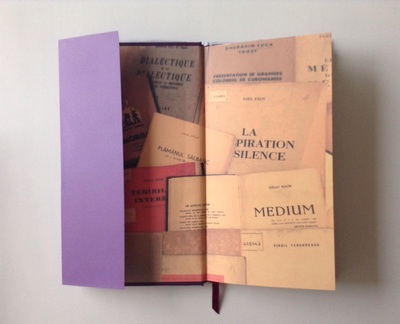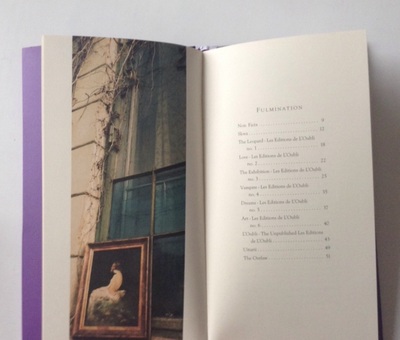|
During 2007, Romania joined the European Community. In a way, the last, true and correct statement, embodies one of those curious ironies of modernity because Romania has always been something like a nation off to the obvious central axis of whatever civilization, especially the orbit of the West. Starting with its language, whose core structure is derived from the Latin vocabulary and surrounded with other Slavic elements besides the Hungarian resonances – that many Romanians would say, not without reason, are barbaric. Perhaps because of this the early twentieth century avant-garde, when arrived in this distant country, were recognized as new forms of decentralization – ex nihilo, new languages, new possibilities of life and new continents arose in the picturesque and beautiful Bucharest. In order to explore this new universe that unfolded within a daily life with plenty policy fierce (and subsequently oppression), a publisher, Les Éditions de L'Oubli, appeared. In a very brief period of activity (1940-44) this publisher launch some art objects as a book form, pioneering works in incredible editions – authors directly linked to the Romanian surrealism, as Gherasim Luca, Dolfi Trost, and Virgil Teodorescu.
Perhaps an example could be useful: the first book published by Les Éditions whose title was Poema in Leoparda, written by Virgil Teodorescu with Dolfi Trost illustrations (using a technique discovered by him, the "stilamancie", which produced images similar to those employed in the Rorschach test). The two authors/illustrators unveil a wild and peninsular territory In this poem, inhabited by fantastic animals and complex mirages. This territory has, besides a cartography, a language – the poem has a bilingual shift between a phonetic language invented for the leopards, full of polysemic possibilities, and Romanian. Little remains of this unique book - the title page, some sections of the poem and two illustrations. The titles produced by Les Éditions have a melancholy fate that created a projection of these lost books in the free and wide field of imagination, which reappear as objects of dreams and nightmares, utopias evoked by the historical record that paradoxically feeds the myth and cheats oblivion. Indeed, the historical record, when articulated with skill and art, allows the reader to the establishment of relational webs that make the balance between myth and history even more complex. Thus, it can be stated that the Teodorescu/Trost Poem in Leoparda is near, for his phonetic construction poetry and imaginary invention in Imago Mundi style, to the Dadaists and Surrealists; but it is not absurd to imagine this work near to the unusual poetic and narrative forms like Los San Signos by the Argentine Xul Solar, another avant-gardist on the margin who invented a language. In this sense, Letters from Oblivion by Andrew Condous (a mysterious character, much like the publish house that he seeks in the past) emerges as a powerful reading: a blend of historiographical surrender and esoteric novel that reworked the story of these mythical books. Thus, we follow Condous through the destiny of each published book and also those that existed only in project never materialized, with careful reconstruction of narratives, poetic creations and concepts this feverish production. The discourses of memory, history and fiction intersect but do not dissolve, maintaining some autonomy. There is no some deep historical context analysis of surrealism or avant-gardes in general. Also there is no Romania socio-political examination during the Second World War, when Les Éditions has been active. The central axis of Coundous is the publish house and its books, deviating the focus only at the end, in the long and elegiac chapter entitled "The Outlaw", which tells the fate of Victor Valeriu Martinescu, aka Dalombra (The Shadow), aka Marele Contemporan (The Great Contemporary), aka Haiduc (The Outlaw) aka VVM, the great Bucharest avant-garde articulator in the years 1930-40, as well as a Les Éditions propelling itself. Poet and illustrator/painter, his work has spread to various periodicals (including those belonging to the Romanian fascist group Iron Guard, which had terrible consequences to the author after 1947), published only one novel and a book of poems illustrated by him. The Stalinist oppression that crushed Romania reach Martinescu, who was arrested in 1947 at the Covasna station, the first main stop out of Bucharest. After intense interrogation, he was sent to the Jilava prison, where he spent some time confined in the infamous Chamber Zero. In this cell, whose name seems designed by a science fiction pulp author, there were only beds and a powerful central bem of light that prevented the strange comfort provided by darkness. Sentenced to death, was pardoned and released in 1964. Then he lived thirty years, mostly in Bucharest, communicating with his Surrealist group friends and maybe writing texts that have been lost or ignored, in some secret place. His death in 1994, remains a mystery. Seems understandable this choice, the biographical final chapter for a book about a publish house whose production today is almost invisible – Martinescu somehow materialized in his life and death the progress of the Les Éditions books, a destination that remains open for all and any Work of Art in the vast world and somehow for every one of us. Letters from Oblivion is a carefully crafted book: a purple jacket shows the title, author and other information because the book itself, made of purple fabric contains no marking or information. The internal art – photographs and illustrations – as well as the typography is exquisite, the usual in the Dan Ghetu and Jonas Ploeger editions, which recovers in the twenty first century the name and tradition of Les Éditions de L'Oubli. This is a mysterious object without its protective covering, a distinctive feature of the new Les Éditions releases. The two publishers (from Bucharest and Dusseldorf) dedicate themselves to the unusual, poetic, complex, contradictory and decentered. Hopefully this partnership will be much longer and less painful than its first incarnation.
0 Comments
Leave a Reply. |
Alcebiades DinizArcana Bibliotheca Archives
January 2021
Categories
All
|



 RSS Feed
RSS Feed
